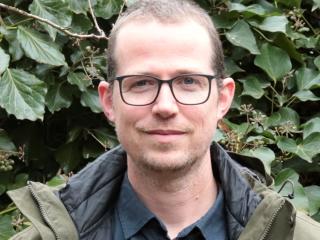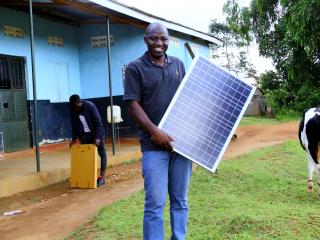The use of green hydrogen and the chicken-and-egg problem: how the law can solve it
How do we move away from the use of fossil fuels towards climate neutrality? Sustainable hydrogen has great potential but is not widely available yet, nor are we ready to use it. Law scholar Max Baumgart of the Tilburg Institute for Law, Technology and society (TILT) is investigating how to stimulate markets for sustainable hydrogen as well as innovation by means of rules and regulations. Baumgart: “We need a comparative approach and legal experimentation to generate the best ideas and avoid taking the wrong turn.”
Why is green hydrogen important?
“Green hydrogen is a sustainable energy carrier. It’s a gas, H2, that is generated from water by the process of electrolization. But you need electricity to create it, so if the electricity comes from wind or solar energy, the hydrogen is ‘green’. There is also blue hydrogen which is produced mainly from natural gas, using a process called steam reforming, which brings together natural gas and heated water in the form of steam. But the carbon that is released in the process of making it is captured and stored. Both green and blue hydrogen are a key lever for the energy transition. They are especially useful to decarbonize industries such as steel production or chemical factories, as well as the energy sector itself. It can be transported by ship, truck or pipeline and can also be stored. What’s more, in the European Union we want to increase our energy sovereignty and become independent from for instance Russian gas, even more so since the war against Ukraine. So finding a green gas to replace fossil fuels is a big factor in the energy transition.”
Why is hydrogen not big business yet?
“It’s the chicken-and-egg problem. There is practically no demand for green hydrogen yet and therefore hardly any production. So we need incentives to get the market going, such as subsidies for innovation and clear goals for the industries. Businesses need to have investment security to able to take on the challenge. Pipelines need to be built for transportation and there is also the need for subsidies for steel production companies to invest in the use of green hydrogen. There is still a long way to go. In the European Union both the Council of the European Union and the Parliament have now provisionally agreed to shape the gas market in a new way that really puts the emphasis on decarbonized gases and hydrogen.”

The energy transition is mainly legally driven because it starts from the political will to do it which then needs to be transferred into rules and legislation
Where do you come in as a law scholar?
“The energy transition is mainly legally driven because it starts from the political will to do it which then needs to be transferred into rules and legislation. I’m looking into the role of the law in the energy transition and more specifically how it can be efficiently used to develop markets for green and blue hydrogen. By comparing law proposals in different countries we can for instance learn from best practices and speed up the transition. But I have also investigated the use of ‘regulatory sandboxes’ which give market players more freedom to experiment new business models and even deviate from current legislation under supervision of the market authorities. We need that to generate the best ideas and avoid taking the wrong turn, so I’m advocating this option. Moreover, in the European Union we need harmonized internal market rules to drive down the costs and at the same time make sure that all member states benefit, both the big ones that can make the transition more easily as well as the others.”
It sounds quite complicated to make the transition -- are you optimistic it will happen?
“Yes definitely. But there is a lot of work to be done so I’m also advocating energy law as a field of study. We need good students to commit to solving the legal challenges that are connected with the energy transition. If students do commit, I can promise them to have a great career ahead. There are big and complex issues at stake for which we need to find solutions. Not only is the climate crisis affecting the way we humans live on this planet. Also, energy is used as a weapon, and governments are trying to find solutions to avoid being affected by the energy crisis. I hope my work will contribute to finding solutions.”
Do you want to dive a little deeper?

Here’s a knowledge clip which explains Max Baumgart`s way of exploring regulatory strategies for accelerating the development of sustainable hydrogen markets in the European Union.
Join us on March 28, 2024 for Alumni Startup Night: Climate & Energy transition
A joint event of Tilburg University and Eindhoven University of Technology
- Share your knowledge and experience
- Expand your network, also with TU/e alumni
- Get new insights
Learn more:
Tilburg University strives to contribute to broad prosperity: a green, social and prosperous future for all. Check out our topic dossiers for new insights into labor market and talent development, healthcare and wellbeing, climate and energy and the digital society.
Date of publication: 29 January 2024



